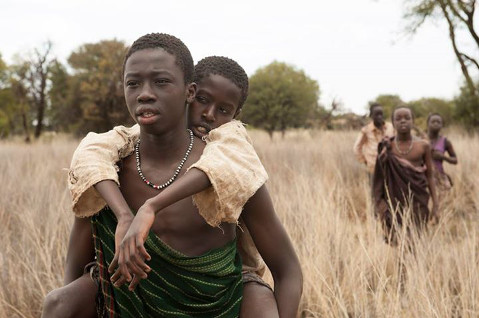The Good Lie
Dishonesty Can Sometimes Be the Best Policy

While the past few weeks have brought oodles of good cheer, presents, and hugs from friends, family, and especially my grandchildren, I had not one suggestion for a column — in this season when many columnists pull their hair out — not even from my son or son-in-law, who are in the business of selling ideas for a living.

I also came up empty in my usual routine for harvesting column topics, which is to ask everyone who will talk to me for more than a minute — the mailman, the grocery clerk, my gym buddies, fellow hikers, the cashier at Trader Joe’s, and even on occasion a “Bob” from India — about an idea for a column. I also poured over newspaper, magazines, blogs, and websites.
I was desperate. Even as the countdown to New Year’s beat in my head, I had no ideas for a column. That is, until I saw a new, excellent, but unfortunately little-promoted film, The Good Lie. (L.A. Times discusses why it took so long to make the movie here. In order to put the ethical issue raised in this movie in context, first the storyline of the film itself.
The Good Lie is a fictionalized account of the humanitarian project that eventually brought thousands of Sudanese refugees to the United States prior to 9/11. The film focuses on a group of five children who must walk over 750 miles through treacherous war-torn areas to reach an over-crowded but safe refugee camp in Kenya. During their months-long trek, inevitably they are confronted by soldiers. While his brothers and sister hide nearby, the eldest, Theo, saves them by lying to the armed men and saying he’s alone. Theo is taken, and the four remaining siblings, though they reach the refugee camp, are unable to get visas to the United States or any other country for almost a decade. The film details, sometimes in a humorous manner, the strange culture they face when they finally get to America. Then the scene comes that saved me from a blank page.
In night school, a now-grown-up Mamere reads The Adventures of Huckleberry Finn. His teacher asks if it’s a “good lie” when Huck lies to a group of white hooligans to save Jim. The class is stumped except for the Sudanese student, who recalls the lie his brother told to save him and the others. When he tells the class that Huck has acted unselfishly in telling racist hunters that there were no blacks in the boat, his teacher applauds him.
With the slight caveat of a spoiler alert, the other “good lie” that occurs by the end of the film — after Mamere returns to Kenya to search for his older brother — is simply heartrending.
Most of us will never have to face the tough choices that confronted these Sudanese children, but we do face times in our daily lives when we perceive that one of our choices is to tell a lie. We want it to be a “good lie.” How do we apply a one-size-fits-all measurement to ensure our lie is a “good lie,” that is, a morally acceptable one?
We can’t. Even a good lie comes with so many variables in a multitude of life situations. Most of the examples used by academics and others who write about lying are not helpful. Their illustrations of the “good lie” typically contain hyperbolic factual scenarios few, if any, of us will ever face. For example, a professor might ask the following: You and your family are visiting North Korea when you are detained by the not-so-secret police. The Supreme Ruler himself asks you if President Obama’s daughters have sent you to blow up his home theater. If you say that they did, he will release your family. Do you lie?
Damn right you do. Unless, of course, you’re Sylvester Stallone or Tom Cruise and there’s a film crew lurking in the background. Or you just don’t care much for your family.
There are those who believe that lying under any circumstance is always wrong. I strongly disagree. In my experience, when given a clear choice, most people don’t want to lie. But there are those times when circumstances arise and we do lie because we believe that a “good lie” is better than the truth.
To determine if that situation is what confronts you, a few salient — but not inclusive — questions are:
• Is the lie merely self-serving?
• Does anyone else gain anything positive from the lie?
• Will the lie prevent harm to anyone?
• Will the lie give someone hope?
• Does your lie delay someone’s pain and suffering?
• Is your lie one of omission? You just don’t tell all the facts?
• Will the lie make a social interaction more comfortable for someone — besides you?
• Will the lie preserve someone’s feelings?
• Will your lie immediately help someone, even though there may be long-term consequences for that person?
• Does your lie merely cover up your own wrong doings?
I hope, using at least some of the questions above, you’ll be able to decide whether the lie you contemplate is a “good lie,” or not.
Phew! Thanks to the movie The Good Lie, I have a column to wish you a peaceful and healthy New Year’s.



